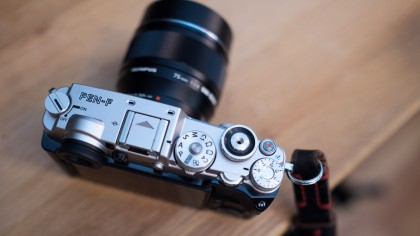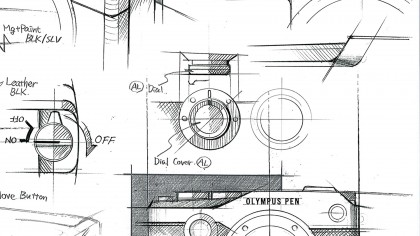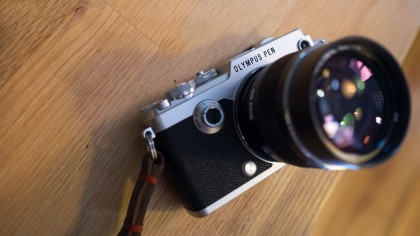Keeping the spirit of film alive in the Olympus Pen-F
Sign up for breaking news, reviews, opinion, top tech deals, and more.
You are now subscribed
Your newsletter sign-up was successful

A technical marvel
Olympus's first 20MP sensor inside the Pen-F is a huge deal when you consider that the Japanese camera company has used the same 16MP resolution sensor since 2012, when it first introduced the OM-D E-M5.
"We didn't move into 20MP until we could maintain the same quality of noise level and dynamic range that we had with the previous 16MP sensor," Gensel explained. "We're now able to do that and likewise, we wanted something that could satisfy that electronic shutter, because it's another aspect of technological growth in photography."
Electronic shutters have slowly made headway in digital cameras for users who need to shoot in complete silence. What's more, electronic shutters can actuate at incredibly fast speeds, up to 1/32,000 of a second. (A mechanical shutter tops out at 1/8,000 of a second.) Plus, it's a handy when you're trying to shoot in broad daylight with a fully open aperture.

This rangefinder also happens to be the first in Olympus' Pen series to come with an electronic viewfinder (EVF). According to Gensel, this camera comes with the same OLED, 2.36m dot EVF as the OM-D E-M10 Mark II, and it has added almost nothing to its dimensions.
"The viewfinder here being as compact and small, does lend itself to fit well in here," he says. "But understand with most of our products, especially in the compact space, when you open them up they're completely filled."
"I guarantee you, a lot of [the design] was just, okay we have the shell, now make it all fit – because it's definitely packed," Gensel boasts with a laugh.

Recreating film in the digital age
Olympus has also done plenty on the software side, introducing the company's first ever film simulation modes, which you can access by flicking the front dial – another call back to the original half-frame camera.
Sign up for breaking news, reviews, opinion, top tech deals, and more.
Of course, adding the look of film to digital frames has been done before. Fujifilm, for one, has included the popular feature across its range of X series cameras. And we've been doing this with Instagram, VSCO and dozens of other smartphone apps for a while.
Olympus's way of reproducing film emulsions is different in that it's adaptive and allows you to tweak the finer details. The color filter, for example, has customizable hues on the surface but you can adjust sharpness, contrast, high and low key lighting as well.

"If we're talking about monochromatic, there's film grain adjustments from high, low to mid," Gensel explains. "It's a very organic and adaptive process, because it's not going to be the same amount of grain throughout the picture."
"As the tonal areas of the picture change, the grain will change too, like the way film did for that really realistic emulation creation," he continues. "This was [the result of] a very hands on process consisting of comparing fiber prints from negatives and fiber based films from digital stills, then adjusting until the profiles treatment of tone and grain was emulated."
Gensel says he's more interested in what profiles the community will come up with as they share. For now, there isn't a way to upload or download shooting profiles between cameras, but you can share what you've moved around.

"Most people had their favorite film, that they know what it's going to do and how it's going to respond," he says. "They know the level of either the realism or exaggeration they want, and there were some films that were just so rich and so beyond reality but it was still just so insanely fun."
The Olympus Pen-F was made to celebrate the joy of photography with a body and abilities that harkens back to the film days. But it's only when you pick it up that you realize how simple and addictive it can be to play with film – even if only in spirit.
- Get started with these mirrorless cameras for beginners

Kevin Lee was a former computing reporter at TechRadar. Kevin is now the SEO Updates Editor at IGN based in New York. He handles all of the best of tech buying guides while also dipping his hand in the entertainment and games evergreen content. Kevin has over eight years of experience in the tech and games publications with previous bylines at Polygon, PC World, and more. Outside of work, Kevin is major movie buff of cult and bad films. He also regularly plays flight & space sim and racing games. IRL he's a fan of archery, axe throwing, and board games.